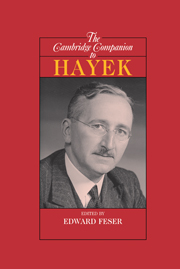Book contents
- Frontmatter
- Introduction
- 1 Hayek and the Austrian tradition
- 2 Hayek on money and the business cycle
- 3 Hayek and market socialism
- 4 Hayek and Marx
- 5 Hayek versus Keynes: the road to reconciliation
- 6 Hayek on knowledge, economics, and society
- 7 Hayek and Popper: the road to serfdom and the open society
- 8 Hayek’s politics
- 9 Hayek the philosopher of law
- 10 Hayek and liberalism
- 11 Hayek and conservatism
- 12 Hayek on the evolution of society and mind
- 13 Hayek on justice and the order of actions
- 14 Hayek the cognitive scientist and philosopher of mind
- Guide to Further reading
- Bibliography
- Index
14 - Hayek the cognitive scientist and philosopher of mind
Published online by Cambridge University Press: 28 January 2007
- Frontmatter
- Introduction
- 1 Hayek and the Austrian tradition
- 2 Hayek on money and the business cycle
- 3 Hayek and market socialism
- 4 Hayek and Marx
- 5 Hayek versus Keynes: the road to reconciliation
- 6 Hayek on knowledge, economics, and society
- 7 Hayek and Popper: the road to serfdom and the open society
- 8 Hayek’s politics
- 9 Hayek the philosopher of law
- 10 Hayek and liberalism
- 11 Hayek and conservatism
- 12 Hayek on the evolution of society and mind
- 13 Hayek on justice and the order of actions
- 14 Hayek the cognitive scientist and philosopher of mind
- Guide to Further reading
- Bibliography
- Index
Summary
F. A. Hayek's long-neglected monograph The Sensory Order: An Inquiry into the Foundations of Theoretical Psychology (1952b) has in recent years begun to garner some attention, most of it from economists or political scientists curious to see what bearing that work has on the foundations of Hayek's economics and social and political thought. Some commentators have also noted the book's relevance to contemporary cognitive science, in particular its foreshadowing of connectionism. Yet few have considered its distinctly philosophical significance - either its place in the history of twentieth-century philosophy or the light it might shed on current controversies in the philosophy of mind.
This is by no means surprising, given that Hayek was not a philosopher by trade. He does not frame the issues he discusses in primarily philosophical terms, and he does not apply to those issues the methods a philosopher would. Notwithstanding his being Wittgenstein's cousin (Hayek [1977] 1992) and his friendship with Karl Popper, he appears not to have sought, nor (except from Popper) was he given, the attention of the mainstream analytic philosophical tradition that dominated the three countries - Austria, England, and the United States - in which he did the bulk of his teaching and writing.
- Type
- Chapter
- Information
- The Cambridge Companion to Hayek , pp. 287 - 314Publisher: Cambridge University PressPrint publication year: 2006
- 5
- Cited by

